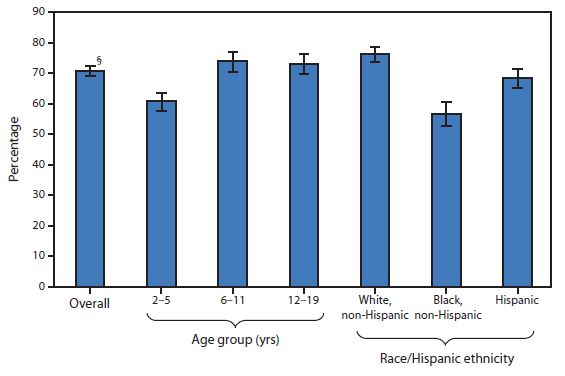QuickStats: Percentage of Persons Aged 2–19 Years Who Consumed Caffeine from Food or Beverages,*† by Age Group and Race/Hispanic Ethnicity — National Health and Nutrition Examination Survey, United States, 2009–2012

* The National Health and Nutrition Examination Survey collects dietary intake information using 24-hour dietary recall interviews. Day 1 24-hour recall data were used in this analysis.
† Caffeine intake from foods (e.g., cookies, brownies, cakes, and candies that contain chocolate) and beverages (e.g., soda, tea, coffee, chocolate milk, and energy drinks) was calculated using the U.S. Department of Agriculture's Food and Nutrient Database for Dietary Studies (Version 5).
§ 95% confidence interval.
During 2009–2012, 70.7% of persons aged 2–19 years consumed caffeine on a given day. Caffeine consumption on a given day was less common among persons aged 2–5 years (60.8%) compared with those aged 6–11 years (73.9%) and those aged 12–19 years (73.2%). The percentage of non-Hispanic black persons aged 2–19 years who consumed caffeine on a given day (56.8%) was less than that of their non-Hispanic white and Hispanic counterparts (76.2% and 68.5%, respectively). The percentage of Hispanic persons aged 2–19 years who consumed caffeine on a given day was less than that of their non-Hispanic white counterparts.
Sources: Ahluwalia N, Herrick K, Moshfegh A, Rybak M. Caffeine intake in children in the United States and 10-y trends: 2001–2010. Am J Clin Nutr 2014;100:1124–32.
National Health and Nutrition Examination Survey data, 2011–2012. Available at http://www.cdc.gov/nchs/nhanes.htm.
Reported by: Namanjeet Ahluwalia, PhD, n.ahluwalia@cdc.gov, 301-458-4372; Kirsten Herrick, PhD; Steven M. Frenk, PhD.
Alternate Text: The figure above is a bar chart showing that during 2009-2012, 70.7% of persons aged 2-19 years consumed caffeine on a given day. Caffeine consumption on a given day was less common among persons aged 2-5 years (60.8%) compared with those aged 6-11 years (73.9%) and those aged 12-19 years (73.2%). The percentage of non-Hispanic black persons aged 2-19 years who consumed caffeine on a given day (56.8%) was less than that of their non-Hispanic white and Hispanic counterparts (76.2% and 68.5%, respectively). The percentage of Hispanic persons aged 2-19 years who consumed caffeine on a given day was less than that of their non-Hispanic white counterparts.
Use of trade names and commercial sources is for identification only and does not imply endorsement by the U.S. Department of
Health and Human Services.
References to non-CDC sites on the Internet are
provided as a service to MMWR readers and do not constitute or imply
endorsement of these organizations or their programs by CDC or the U.S.
Department of Health and Human Services. CDC is not responsible for the content
of pages found at these sites. URL addresses listed in MMWR were current as of
the date of publication.
All MMWR HTML versions of articles are electronic conversions from typeset documents.
This conversion might result in character translation or format errors in the HTML version.
Users are referred to the electronic PDF version (http://www.cdc.gov/mmwr)
and/or the original MMWR paper copy for printable versions of official text, figures, and tables.
An original paper copy of this issue can be obtained from the Superintendent of Documents, U.S.
Government Printing Office (GPO), Washington, DC 20402-9371;
telephone: (202) 512-1800. Contact GPO for current prices.
**Questions or messages regarding errors in formatting should be addressed to
mmwrq@cdc.gov.
 ShareCompartir
ShareCompartir


